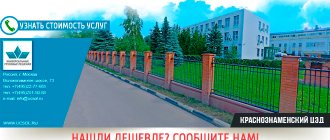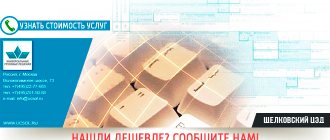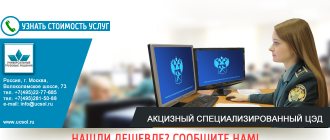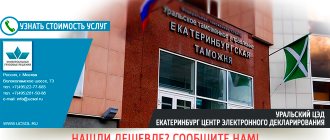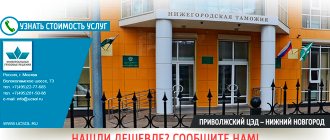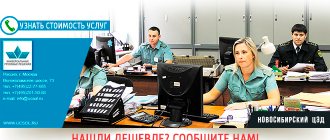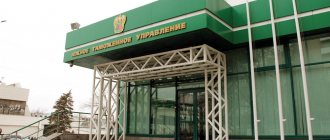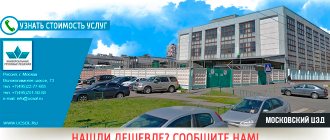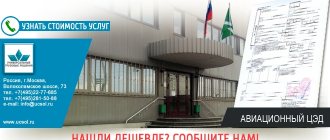Contacts and details
| Name | Ural customs post (electronic declaration center) |
| Customs code | 10511010 |
| Organizational structural form | Customs authority (not specialized) |
| Customs clearance | produced |
| Parent's name | Ural electronic customs |
| Short name | t/p Uralsky (electronic decl. center) |
| Full address | 620075, Sverdlovsk region, Ekaterinburg, st. Gogolya, 27 |
| Website | https://utu.customs.ru/folder/163759 |
| Working with ATA carnets | No |
| OKATO code | 65000 |
| SOATO code | 1165 |
t/p Uralsky (center el.dekl.) on the map
Other posts and customs of Yekaterinburg and Sverdlovsk region
- Koltsovskaya Customs named after V.A. Sorokina (10508000)
- Customs post Koltsovo Airport (cargo) (10508010)
- Customs post Koltsovo Airport (passenger) (10508020)
- Ural Electronic Customs (10511000)
- Ural Customs Administration (10500000)
- Ekaterinburg customs (10502000)
- Customs post Malachite (specialized) (10502050)
- Verkh-Isetsky customs post (10502070)
- Oktyabrsky customs post (10502090)
See also: Ekaterinburg, Sverdlovsk region, CED
Ural CED
Ural CED - contact information
The Ural EDC is an electronic declaration center for the city of Yekaterinburg, Sverdlovsk region.
Previously, it was known as the Yekaterinburg EDC, or the Ekaterinburg Electronic Declaration Center - Ekaterinburg Customs EDC. However, on October 25, 2018, the customs authority was renamed the Ural Customs Post CED - Electronic Declaration Center. The Ural CED is a new type customs post. It uses innovative technologies for remote electronic declaration, which allows goods located at any of the 37 customs posts of the Ural Customs Administration (UTU) of the Federal Customs Service of the Russian Federation to be declared in the Ural CED. The area of responsibility of the Ural CED includes customs posts (c/p) of all 6 customs offices of the Customs Directorate of the Federal Customs Service of the Russian Federation:
- Ekaterinburgskaya - 10502000 (11 t/p);
- Koltsovo customs named after V. A. Sorokin – 10508000 (3 t/p);
- Tyumen - 10503000 (4 t/p);
- Khanty-Mansiysk - 10505000 (5 t/p);
- Chelyabinsk - 10504000 (10 t/p);
- Yamalo-Nenets - 10506000 (4 t/p).
The Ural CED (code 10511010) is a structural subdivision of the Ural Electronic Customs - UET (code 10511000), which is part of the system of customs authorities of the Ural Customs Administration (UTU) of the Federal Customs Service of the Russian Federation. Another CED of the Administration of the Federal Customs Service of the Russian Federation is the South Ural CED (code 10504110) of the customs of the Chelyabinsk region (code 10504000).
The Ural Center for Electronic Declaration is endowed with broad powers; this customs authority has the right to carry out customs clearance - “customs clearance” for imports, “customs clearance” for the export of any goods.
- Full name: Ural customs post - electronic declaration center
- Short name: Ural Electronic Declaration Center (EDC)
- Customs post code: 10511010
- Status: valid from 10/25/2018
- Customs authority: no specialization
- Customs clearance: carried out
- Works with ATA carnets: no
- Address: 620075, Russian Federation, Sverdlovsk region, Ekaterinburg, st. Gogolya, 27
- Email – Documentary Support Department of the Ural Electronic Customs
- Telephones – acting Head of the Center for Economic Operations Dmitry Borisovich Batalov, - Deputy. Head of the Center for Economic Operations Olga Nikolaevna Khlybova, – Deputy. Head of the Center for Economic Operations Sergey Borisovich Babich, - Deputy. Head of the EDC Dmitry Valerievich Kozlov, - Ural Electronic Customs, duty officer, - head of the technical department. support of UET Elfimov Alexey Alekseevich, - head of UET, colonel of the customs service Epifanov Sergey Alexandrovich
- OKATO code: 65000
- SOATO code: 1165 (Sverdlovsk region)
- Opening hours: from 09:00 to 21:00 – daily
Customs posts located in the coverage area of the Ural Central Economic Commission
10502000 — Ekaterinburg customs:
- 10502020 — Customs post Asbestovsky
- 10502030 — Customs post Irbitsky
- 10502040 — Customs post Kamensk-Uralsky
- 10502050 — Customs post Malachite (specialized)
- 10502060 — Customs post Pervouralsky
- 10502070 — Customs post Verkh-Isetsky
- 10502090 — Customs post Oktyabrsky
- 10502100 — Customs post Novouralsky
- 10502130 — Customs post Nizhny Tagil
- 10502140 — Verkhnesaldinsky customs post
- 10502150 — Customs post Serovsky
10503000 — Tyumen customs:
- 10503020 – Customs post Roshchino Airport
- 10503030 — Customs post Tobolsk
- 10503050 — Customs post Tyumen
- 10503060 — Customs post Kurgan
- 10503062 - OTO and TC N2 Kurgan Customs Post
- 10503070 — Customs post Nizhnevartovsk
- 10503080 — Customs post Novourengoysky
- 10503090 — Customs post Noyabrsky
- 10503100 – Salekhard customs post
- 10503110 — Customs post Surgut
- 10503120 — Customs post Nizhnevartovsk Airport
- 10503130 — Tarkosalinsky customs post
- 10503140 — Customs post Khanty-Mansiysk
- 10503150 — Customs post Yugorsky
10504000 — Chelyabinsk customs:
- 10504010 – Customs post Balandino Airport
- 10504030 — Customs post Chelyabinsk Electrometallurgical Plant
- 10504040 – Customs post Miass
- 10504041 - GTO and TC Miass Customs Post
- 10504042 - OTO and TC N2 Miass Customs Post
- 10504050 — Customs post Ozersky
- 10504070 — Customs post Troitsky
- 10504080 — Chelyabinsk customs post
- 10504110 — Customs post Yuzhno-Uralsky (electronic declaration center)
- 10504170 – Customs post Kartalinsky
- 10504180 — Customs post Magnitogorsk Zheleznodorozhny
- 10504190 — Customs post Magnitogorsk Airport
10508000 — Koltsovo customs named after V. A. Sorokin:
- 10508010 Customs post Koltsovo Airport (Cargo)
- 10508020 Customs post Koltsovo Airport (Passenger)
- 10508030 Customs post Koltsovo Airport (Postal)
Customs broker services
- Personal customs clearance specialist;
- We prepare and execute the necessary documentation - declarations, applications, various permitting forms, documents, reporting;
- Recommendations on HS codes for goods;
- Preliminary calculation of customs value and amount of advance customs payments;
- Drawing up DT projects and related documents;
- Document flow with customs;
- Submission of information at the request of the Ural customs post (electronic declaration center);
- Representation of the Customer's interests in the customs authorities of the Russian Federation;
- Organization, if necessary, of preliminary customs inspection of goods and vehicles before submitting the DT;
- Drawing up a declaration of intent under the seal of the customs representative;
- Consulting in the field of foreign economic activity (FEA);
Price
One consignment of goods is understood as a consignment of goods sent at a time to the consignee using one waybill in one vehicle within the framework of one foreign trade contract.
| Type of work | Cost without VAT) |
| Carrying out customs operations and declaring goods of one consignment in import mode (IM 40): - consulting; — checking the package of documents provided by the Customer for customs clearance of one consignment (including shipping documents); — formalization of delivery documents, preparation, filling out the declaration form and electronic submission to the customs authority. | from 5,000 rubles |
| Carrying out customs operations and declaration for each subsequent consignment in import mode, if there are several consignments in one vehicle (IM 40): - consulting; — checking the package of documents provided by the Customer for registration of one consignment (including shipping documents); — formalization of delivery documents, preparation, filling out the declaration form and electronic submission to the customs authority. | from 4,000 rubles |
| Registration of each additional sheet of goods declaration, starting from the 5th (fifth) product in the import mode (IM 40). | from 450 rubles |
| Carrying out customs operations and customs declaration of goods of one consignment in export mode (EC 10): - consulting; — checking the package of documents provided by the Customer for one consignment (including shipping documents); — formalization of delivery documents, preparation, filling out the declaration form and electronic submission to the customs authority. | from 3,000 rubles |
| Carrying out customs operations and declaring goods of one consignment (other modes): - consulting; — checking the package of documents provided by the Customer for customs clearance of one consignment (including shipping documents); — formalization of delivery documents, preparation, filling out the declaration form and electronic submission to the customs authority. | from 10,000 rubles |
| Payment (additional payment) of any types of customs duties under one DT on behalf and on behalf of the Customer, using the representative’s own funds through terminal payment using a customs card/online service of the ROUND payment system. | from 3% of the documented payment amount (additional payment), but not less than 1,000 rubles |
| Assistance in obtaining a Declaration of Conformity with the CU TR for goods, as well as other permitting documents. | discussed individually |
Connected by one number and not one digital digital signature
Over the next two years, the Federal Customs Service of Russia will “weave” a network of electronic customs offices and electronic declaration centers (EDC) throughout the country.
From Sakhalin to Kaliningrad, registration of declarations and release of goods will gradually be transferred to automatic mode. The timing of control activities will be reduced, and the burden on participants in foreign economic activity will be reduced significantly. The first steps towards total digitalization have already been taken. Electronic customs began work in three federal districts: Volga, North Caucasus and Ural. First Deputy Head of the Federal Customs Service of Russia Ruslan Davydov said in an interview with Logirus that the Federal Customs Service is satisfied with the interim results. And UchVEDs shared their real experience and problems of the transition period.
Why have the deadlines for issuing import declarations electronically increased? Will customs and business be able to find a “common format” for electronic document management? And most importantly, are the implementation of electronic services as “smooth” as high-ranking government officials say?
The first “digital experience” was shared with Logirus by:
PJSC Magnitogorsk Iron and Steel Works
Advisor to the General Director of SV-TRANSEXPO Group Marina Lyakisheva
Technical Director of Transcertico Alexey Inshakov
First Deputy Head of the Federal Customs Service of Russia Ruslan Davydov
Connected by one network – customs and electronic
By the end of 2021, eight electronic customs offices will be created in Russia, one in each federal district, seven electronic declaration centers (EDCs) as part of fully functional customs offices, and an electronic customs office at the Moscow air hub.
In total, there will be 16 customs authorities authorized to issue electronic declarations for goods throughout the country instead of the 555 currently available. Three maritime EDCs will operate in fully functional customs offices: Baltic, Novorossiysk and Vladivostok. They will be responsible for the clearance of cargo from the Baltic, North-Western, Azov, Black Sea and Pacific basins.
At the moment, electronic customs offices operate in three federal districts - the Volga, North Caucasus and Ural regions, and maritime EDCs have also begun their work in Novorossiysk and Vladivostok. The CED also operates at the Kaliningrad Regional Customs.
– The concentration of declarations in electronic customs offices now ranges from 84% to 97% of the declaration array of the three federal districts. Starting from October 24-25, electronic customs issued more than 30 thousand electronic declarations. Thus, they have already returned to normal operation. At the same time, no major disruptions in their work were recorded during the reporting period,” noted First Deputy Head of the Federal Customs Service of Russia Ruslan Davydov.
“Since the launch, electronic customs offices in three federal districts have already issued more than 30,000 digital declarations”
Online customs lacks “offline hands”
The first electronic declaration issued in the Ural Federal District was filed by PJSC Magnitogorsk Iron and Steel Works (MMK).
According to the press service, the release took 14 minutes. However, as Logirus was told at the enterprise, this is not always the case. “Digital Pioneers” with the newly formed customs office and the EDC in its composition have been operating since October 25. The period is short, so the plant refrains from categorical and hasty assessments. However, they do not hide the fact that there are problematic issues regarding customs clearance, but they are “resolved in the course of joint work” between MMK specialists and inspectors.
In particular, the company noted that the time frame for issuing import declarations has increased. At the plant, this is due to the “understaffing of the central electronic control department.” And they hope that when all the necessary personnel are recruited, the problem will disappear by itself. As Logirus found out, the total staffing level of the Ural Electronic Customs should be 224 people. Of these, 119 are employees engaged exclusively in processing declarations. However, as of November 6, the staff was only 50% staffed. At the same time, the average “throughput” of the EDC is 800-900 declarations per day.
The staff of already opened electronic customs offices is not yet fully staffed. For example, in the Ural Electronic Customs, the need for personnel, as of November 6, is only 50% fulfilled
Logirus’s interlocutors at MMK also noted that the CED specialists, who daily process a huge declaration array, are not familiar with the specifics of cargo and the work of a particular enterprise. Similar “gaps” in knowledge “affect the speed of decision-making on issuing a declaration for metal products of PJSC Magnitogorsk Iron and Steel Works.”
“I don’t understand your format”
According to the technical director of Transcertico, Alexey Inshakov, the process of modernizing the FCS will slow down until nothing changes in actual control.
– Inconsistency between the actions of the EDC posts and the actual control posts, their distance from each other, the difference in time zones, actual software failures... In connection with this, queues for inspection operations, including due to the “skew” of the compared volumes of documentary circulation and actual goods, sometimes reach up to 20 days at some terminals. Declarations for goods have to be “resubmitted” several times, the expert explains.
To increase the efficiency of customs operations for business, customs needs to automate “reconciliation of the actual location of goods at terminals from arrival posts,” completely eliminating the human factor, believes Alexey Inshakov. For example, when placing goods in temporary storage warehouses, the data should automatically go into some kind of archive so that “even the inspector pressing a key is excluded.”
In addition, if one of the EDCs is overloaded, it would be advisable to automatically redistribute declarations to another, regardless of where they were originally submitted. And register them already in the area of activity of other electronic customs offices.
In addition, in the first stages, the Federal Customs Service, of course, must closely “monitor” online the process of loading declarations, all kinds of failures, as well as messages from UChVED about the occurrence of force majeure. In order to be able to quickly adjust actions and settings, Logirus’ interlocutor summarizes.
Another disadvantage, notes Marina Lyakisheva, advisor to the general director of the SV-TRANSEXPO Group of Companies. Registration through electronic customs increases, rather than reduces, the number of additionally requested documents and information. For example, documents related to control of technical regulation of goods.
“We are talking about test reports that no one has requested before,” explains Marina Lyakisheva. - And now they’re checking. And they may even refuse to release the goods if the customs officer suspects incorrect information in its English description. In the composition, for example. And this is the data whose accuracy must be verified by Rospotrebnadzor. Now this has become interesting to customs officers.
In a conversation with Logirus, the expert also noted technical problems. One of them is the existence of more than 400 electronic document formats that customs works with. And they often do not coincide with the international formats in which departments of foreign economic affairs receive documents from foreign partners. As a result, documents have to be transformed either manually or using the services of specialized portals, but for a fee.
Now UChVEDs have to transform each document into a different electronic form, which the Federal Customs Service system can “read”
– Every document that I have in electronic form, I must manually transform into another electronic form that is accepted by the FCS system. This is nonsense. This is a manifold increase in the work of UChVEDs. At least at this stage,” sums up Logirus’s interlocutor.
The fact that the software needs to be improved is also noted by specialists from the Magnitogorsk Iron and Steel Works. In their opinion, all information to customs operations specialists should initially be received electronically.
The Ural EDCs have not thawed out yet
The Federal Customs Service receives dozens of questions every day about various aspects of the work of EDCs.
One of them reached Logirus. Foreign trade specialist Mikhail Dikovsky from Chelyabinsk asked to clarify how the Ural EDC interacts with external customs posts where goods are placed. Mikhail himself, based on paragraph 6 of the order of the Federal Customs Service of Russia dated July 13, 2021 No. 1110 “On improving the structure of the Yekaterinburg and Ural electronic customs and on introducing changes to the annex to the order of the Federal Customs Service of Russia dated July 21, 2015 No. 1455,” believed that The region of activity of the Ural EDC is the Russian Federation. However, as Logirus managed to find out, this hypothesis is not entirely true.
The Ural Customs Administration does not deny Order No. 1110 of the Federal Customs Service of Russia. However, it indicates the existence of a letter dated March 28, 2012 No. 01-11/14513 “On the use of technology for remote release of goods” by the same author. Based on this document, the “remote release technology” for the Ural EDC is so far limited to the territory of the Urals Federal District.
– Previously, a similar procedure (LR. remote release) was used in conjunction with posts in the region of operation of which temporary storage warehouses were located. But from November 15, 2021, this provision was terminated on the basis of the letter of the Federal Customs Service of Russia No. 01-11/66432 dated October 19, 2018, explained the press service of the Ural Customs Administration.
Urgent digital assistance to foreign economic authorities
On the other hand, business understands that starting from scratch and establishing uninterrupted operation of electronic customs throughout the country cannot be done overnight.
It takes time, money and specialists. And it would be even better to launch “pilot projects with clearly established deadlines and subsequent evaluation of the results,” says the adviser to the general director of the SV-TRANSEXPO Group of Companies. Then, based on the errors of one or two EDCs, it would be possible to draw appropriate conclusions and work on the errors. And after that, massively restart the system. But start doing this from less busy customs offices. – And now everything is happening very quickly. It is clear that if you open one EDC every month, it will be impossible to respond to errors that arise during trial operation. The deadlines should be longer, says Marina Lyakisheva.
In addition, businesses would like to communicate more often with customs about the electronic services being introduced. The Magnitogorsk Iron and Steel Works proposes to use the format of joint conferences, at which departments of foreign economic affairs could receive clarification on current problematic issues in the work of electronic customs. Marina Lyakisheva considers the best option to be a “hotline” on the FCS website, where one could quickly turn for help.
However, it would be a mistake to think that business sees only disadvantages in electronic customs. No, the Department of Foreign Economic Affairs has high hopes for the digitalization of customs control. For example, Transsertiko is confident that EDCs will definitely speed up document flow, declarations will be registered automatically more and more often, documents can be submitted to any electronic declaration center, the transparency of customs clearance will increase, “court brokers” will have to work like everyone else, and automatic release will cease be "exclusive".
The introduction of electronic customs is part of the large-scale development concept of the Federal Customs Service, which is defined until 2021. The main provisions of this concept are also defined in the new customs legislation: the EAEU Code and the Federal Law “On Customs Regulation”. Read about how these documents were created and how many copies were broken due to a lack of understanding of customs and foreign trade departments in the articles: “We divided the orange. There are many of us - one code" And also "Federal Law-KhZ or the bill of yesterday"
Operating procedure
- Request. You leave a request in any convenient way: by phone, email or through forms on the website.
- Consultation with a specialist. We call you back and find out your task in the field of foreign economic activity and inform you of the price for customs clearance.
- Signing the contract. Agreeing on the terms of cooperation and signing the contract.
- Preparation of documents and certificates. Collection and preparation of the necessary permits for the import or export of your goods.
- Customs clearance. Submitting a declaration, resolving disputes and attending inspections and inspections.
